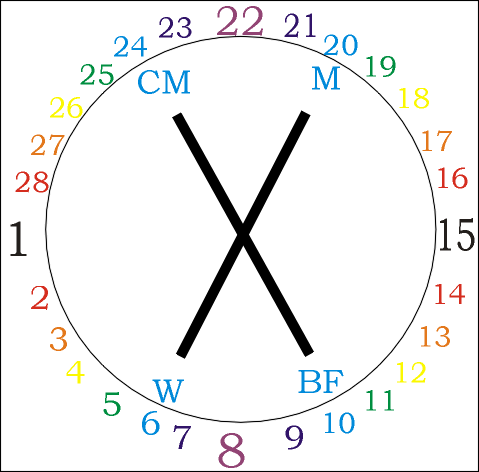
F: Superstition
F: Authority
6 FCM
24 TM
| The attributes of the Faculties when Will is at Phase 6 | derived from | modified by | from | description | ||
| Will | Artificial individuality | 6 | ||||
| Mask | True | Justice | 20 | BF | 24 | Enforced success of action |
| False | Tyranny | CM | 10 | Dramatisation of Mask | ||
| Creative Mind | True | Ideality | 24 | BF | 20 | Objective action |
| False | Derision | FCM | 6 | Authority | ||
| Body of Fate | Humanity | 10 | ||||
| Composite of Faculties | |
|---|---|
| true | Artificial individuality seeks to deliver ideality, modified by objective action, from justice, modified by enforced success of action, with the help of humanity. |
| false | Artificial individuality is misdirected to derision, modified by authority, bringing tyranny, modified by dramatisation of the Mask, separated from humanity. |
 | Attributes of Phase 6 | affects | modifies | |
| Will | Artificial individuality | 6 | - | |
| Mask | T:
Fatalism
F: Superstition | 20 | - | |
| Creative Mind | T:
Constructive emotion
F: Authority | 24 | 10 TM 6 FCM | |
| Body of Fate | Enforced emotion | 10 | 20 FCM 24 TM | |
See AV B 113-14 & 96.
Walt Whitman
Yeats�s description of the phase from A Vision |
|
Had Walt Whitman lived out of phase, desire to prove that all his emotions were healthy and intelligible, to set his practical sanity above all not made in his fashion, to cry 'Thirty years old and in perfect health!' would have turned him into some kind of jibing demagogue; and to think of him would be to remember that Thoreau, picking up the jaw-bone of a pig with no tooth missing, recorded that there also was perfect health. He would, that he might believe in himself, have compelled others to believe. Not being out of phase, he used his Body of Fate (his interest in crowds, in casual loves and affections, in all summary human experience) to clear intellect of antithetical emotion (always insincere from Phase 1 to Phase 8), and haunted and hunted by the now involuntary Mask, created an Image of vague, half-civilised man, all his thought and impulse a product of democratic bonhomie, of schools, of colleges, of public discussion. Abstraction had been born, but it remained the abstraction of a community, of a tradition, a synthesis starting, not as with Phases 19, 20 and 21 with logical deduction from an observed fact, but from the whole experience or from some experience of the individual or of the community: 'I have such and such a feeling. I have such and such a belief. What follows from feeling, what from belief?' While Thomas Aquinas, whose historical epoch was nearly of this phase, summed up in abstract categories all possible experience, not that he might know but that he might feel, Walt Whitman makes catalogues of all that has moved him, or amused his eye, that he may grow more poetical. Experience is all-absorbing, subordinating observed fact, drowning even truth itself, if truth is conceived of as something apart from impulse and instinct and from the Will. Impulse or instinct begins to be all in all. In a little while, though not yet, it must, sweeping away catalogue and category, fill the mind with terror. (AV B 113-14) |
See a broader view of the Phase in the consideration of the Phase Triads.